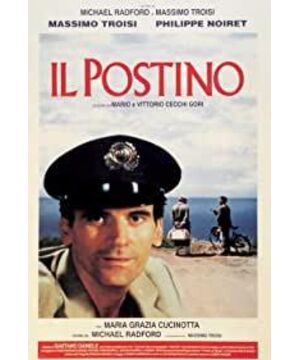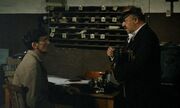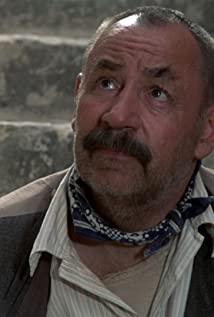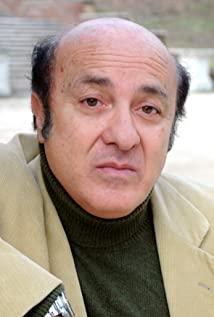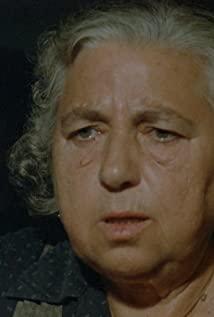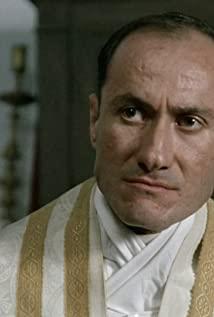In the era we live in, although many angry young people are protesting loudly against this noisy city, cunning human nature, ruthless industrialization, etc., although many petty bourgeoisie are singing in the emerging urban hotbed with various deconstruction and liquidationist attitudes , intoxicated, while enjoying modern civilization, while also making various complaints, but we, who have not experienced much idyllic life, seem to have no good reason to raise these protests, because there is no comparison, and there is no reason to compare. However, the moonlight that used to pass through the curtain still shines into our innocent private room. As long as there is a little clue to convince us that we have lived or should live differently, our hearts will no longer be closed. At such moments, we are always eccentric to compare the past with all the bad things in the present, in our imagination. The glorified part, so we have to be dissatisfied, nostalgic, lonely. Movies, as "imagined signifiers", are inherently half-dreams. Many fantasies we long for come from movies, and we are willing to indulge in such dreams. Maybe this is why art can become life's dream. Rescue. The Italian film "The Postman" tells a story: In the 1950s, a small island called "Xiawan" in Italy had beautiful scenery and simple folk customs, but it lacked fresh water all the year round and most people were illiterate. The protagonist Mario is the son of a fisherman on the island. Although he can read and write, he is born with romantic feelings, but he is not good at expressing because of his simplicity and shyness. He fantasized about living in "big places" such as Naples, the United States, and Japan. The pragmatic father always persuaded him to find a job first. At this time, the famous Chilean poet and communist Pablo Neruda was wanted in the country because of his political tendencies and went into exile in Italy. The Italian government placed him and his wife in the "Xiawan". The Italians warmly welcomed the poet of the people, and the post office on the small island recruited temporary postmen to deliver the letters to the great poet from all over the world every day. Mario accepts the low-paying job. Every day he rides his own bicycle over the mountains to the poet's residence, and the poet gives him a little tip every time. At first, Mario just thought that Neruda was a poet who could write wonderful love poems to impress girls, but George, the boss of the post office, admired the poet very much. Under his influence, Mario bought a book of Neruda’s poems. , asking him to sign, but disturbing the poet's thinking, the poet reluctantly scribbled his name. Frustrated, but not losing faith, Mario read some of the poet's poems and summoned up the courage to ask Neruda for advice. Did not expect the poet to be an approachable old man, he By explaining the use of metaphors to him in simple and easy-to-understand language, Mario began to understand the mystery of poetry. Mario wanted to be a poet himself, and Neruda suggested that he go for a walk by the sea. Once, while they were walking by the sea, Mario's idea that everything was a metaphor struck Neruda, who discovered the keen sensibility of the fisherman's son. Once, Mario met a beautiful girl Beatrice in a tavern on the island, but was teased by the girl because she was not good at expressing herself. He went to Neruda and begged him to write a poem for her in Mario's name, and the poet walked with him to the tavern and signed Mario in front of everyone, making Mario become everyone focus of attention. Once, a friend of Neruda sent him a tape. Mario heard that this thing could record various sounds, and became interested in this old-fashioned tape recorder. Neruda asked him to talk about the island into the recording microphone. On the spectacle, Mario hesitated for a long time and only said Beatrice's name, and the girl completely occupied his heart. In order to gain her favor, Mario continued to study the art of poetry and learned from Neruda. He read the poems he wrote to Beatrice, and finally won the girl's heart. Li Cai's aunt's objection, the two finally came together. At the wedding, Neruda recited poetry impromptu as a witness, and at the same time, he received the news that his arrest in Chile had been lifted and that he could return home. After Neruda was gone, Mario still took care of the house he used to live in, where he often went to reminisce about the good times he spent with the poet. Italy was preparing for a general election at this time. The Communist Party and the Christian Socialist Party were at odds with each other. Under the influence of Neruda, Mario joined the Communist Party. Conspiracy to build water pipes. Mario's family thought that the poet had forgotten about them, the hillbillies, because Neruda had not heard from him for a long time. Only Mario believed that Neruda would not forget him and the people. Beatrice was pregnant, and Mario named the unborn child Barbitu, a homonym of Neruda's name Pablo. Once, Mario went to Neruda's former residence and found an old tape recorder that he had left behind. He found George at the post office and asked him to help remodel the machine, and the two men made the sound of the waves lapping on the island, the sound of the roar, the sound of the wind blowing through the bushes, the sound of the wind blowing through the hills, the sound of the chapel bell, The sound of my father pulling the fishing net and the sound of little Barbitu in his swaddling clothes were all recorded as gifts for the poet gift so that he can remember this island, remember Italy. Years later, Neruda and his wife returned to the island to visit the Mario family. At this time, little Barbitu was five or six years old and looked like his father, but Mario passed away. Beatrice told Neruda about Mario's death, and he was invited to speak on stage as a worker representative at a communist rally, and he would take the opportunity to read aloud what he had written, dedicated to the poet Neruda The poems, unfortunately at this time they were suppressed by those in power, and Mario died. The poet finally heard the sound of the wonders of the island that Mario had meticulously recorded for him, but never got the chance to see the old friend again. At the end of the film, Neruda wanders alone on the azure sea, imagining the scene of Mario's sacrifice according to Beatrice's narration. Mario's simple words rang out in his ears. First to commemorate this goodbye. The narration of the film is gentle and has a lighthearted and humorous mood. Until Neruda left, Mario's thoughts of his old man gradually sublimated like a smoke, and finally reached the beautiful realm of poetry. In the end, Mario's sacrifice will make a poet. The deep friendship with a working people has reached a climax. However, even when dealing with the most sensational category such as life and death, the film still maintains a sad but not sad mood. The color shots of the poet walking by the sea and the black and white shots of Mario's sacrifice at the rally are slowly alternated. , along with the gentle sound of the waves and Mario's narration, creating a poetic atmosphere, especially the scene of Mario's sacrifice. Although it will eventually return to dust, poetry and friendship will endure forever. "Happy but not obscene, sad but not sad", "The Postman" once again shows the great charm of poetry films, there is no bitter speculation and difficult philosophy, no cruel exposure or gorgeous decoration, no laissez-faire funny and cheap tears, but no one doubts that this is a great art, a masterpiece that only Italians can create. Perhaps such a masterpiece is really rare, the protagonist Mario plays Massimo. Trossi is a famous Italian comedian and director. He showed superb acting skills in the film. After the filming was completed, he died of a heart attack, which added admirable admiration to this great work outside the film. Color and sighing glamour. The story told in the film undoubtedly belongs to an era. After the Second World War, the Italians who suffered from war and chaos longed for the rescue of new ideas and a strong national rejuvenation. At this time, communism as a new ideology flourished in Italy. In the 1950s, the Italian Communist Party was already running for parliamentary elections. The struggle prevailed, but those in power used the state apparatus to declare the Communist Party an illegal organization and to impose a frenzied repression. Now to discuss the gains and losses of the communist movement at that time has become a historical study, and the filmmakers are obviously not interested in this. The story thinks more about the extraordinary meaning of poetic art in human existence. The poetry here obviously does not only refer to the poems published in the publications. "Poetry" exists as a way of existence in the film. The great poet Neruda, who has won the Nobel Prize for Literature, goes without saying that Mario, as the son of a fisherman, also has a desire and sensibility for poetry. What can you think of? Mario replied, "Sad". It can be seen that "poetry" exists quietly in the heart of every person who loves beauty, pursues beauty, and feels beauty with all his heart - this is another important theme of this film besides friendship. Even an illiterate person, a blind, deaf-mute person, may have poetic feelings. The essence of poetry is by no means the signifier of words. Poetry is rooted in the pursuit of beauty in the collective subconscious of human beings, while words are only representations and means of communication. In the end, Mario not only wrote poems, but also used his own unique way to create poems written with various natural sounds on the island, which are more real and beautiful than words. The simple and natural life of the inhabitants of the island, the honest and straightforward character, the beautiful scenery of the island, and the beautiful girl with the same name as Dante's lover, all of which exist in the form of poetry, showing us a kind of paradise-like beauty. ideal. Mario finally joined the Communist Party, not so much because of his firm belief in communism, but because he believed that what Neruda believed must be as beautiful as poetry. Poetry not only gives people a feeling of beauty, not only does it connect a great poet with a working people, under certain circumstances, it can give a submissive person the courage to fight, and thus change his life, However, what Mario mustered up the courage to read in public was not a political manifesto but a poem dedicated to Neruda. Politics is not the way of poetry, but beauty is the way of poetry. The reason why Guo Moruo's later preaching slogan poems Failure to do so is to confuse the two modes of existence. However, many contemporary elite poets understand poetry from the other extreme. Their too personal poetry completely ignores the existence of universal poetry in human nature. They tend not to communicate with readers, and their direction is also farther from beauty farther and farther. In such a nondescript era, the pain and emptiness we carry are heavy and boring enough. Therefore, we need poetry and dreams. We hope that there will be more such tolerant and beauty-loving artists, who can create a painkiller for them. We can heal the wound and move on.
View more about The Postman reviews


